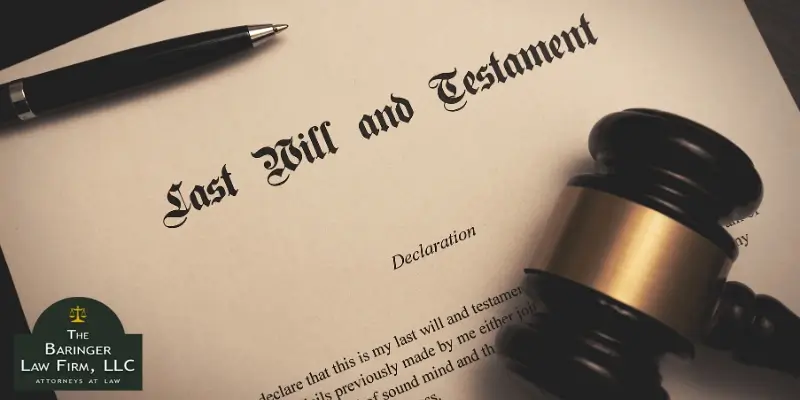|
|
Last
Modified on
Dec 15, 2025
After a person passes, their estate must be distributed to their heirs or beneficiaries. In Louisiana, this is the process of succession. If the person had a last will and testament, it would name the person they wished to be the executor of their estate. It’s important to know: What is the role of an executor in estate planning in Louisiana? The executor of an estate may be appointed by an estate plan or by the court.
How Does a Person Appoint Their Own Executor?
When you make an estate plan, this typically includes a last will and testament at a minimum. In this document, you can list:
- Your assets and debts
- How to distribute your assets
- How to pay off your debts
- The preferred guardian for your minor children
- The executor of your will
The guidelines in your will are followed after your death. When you select an executor, you are choosing someone to manage the complex legal processes of succession for your estate. It is important to talk with a potential executor to determine if this is a responsibility they are willing and able to do. This can help prepare the individual for the process.
The Impact of an Executor on an Estate Plan
If someone is only named the executor in the estate plan, their only duties are to the estate after the death of the individual who made the plan. The executor performs several responsibilities in the management of the estate, but the executor will not necessarily be involved in the rest of the estate plan or in the management of the estate prior to the individual’s death.
Other elements of the estate plan could include the same person named as the executor, such as a power of attorney agent, but this is not necessary.
However, it is very beneficial for all parties that the executor is familiar with the terms of the estate plan, including any changes made to it. Whether the estate plan is only a will or includes more comprehensive documents, the succession process can go more smoothly when the executor knows what to expect.

What If an Executor Is Not Named in the Will?
About 55% of people in the U.S. say that they have no estate planning documents. Only 24% state that they have a will, and 43% of people who have no will say the primary reason is that they haven’t gotten around to it. When there is no will, the estate will be distributed based on the state laws of inheritance.
If a deceased person has not named an executor in their will or does not have a valid will at all, the court will appoint an administrator to act as the executor. Individuals can also apply to be the executor if no one is named. Anyone could apply, including a family member, an heir to the estate, a surviving spouse, or a creditor.
Whether the person managing the estate is a named executor or an appointed administrator, they have very similar responsibilities.
What Does the Executor or Administrator Do?
The executor or administrator handles the succession process, from filing a petition for succession to closing the estate. If someone lived in or died in Baton Rouge, the succession process for their estate will be handled by the 19th Judicial District Court, which is located at 300 North Boulevard.
There are several responsibilities that the executor has during the succession process, including:
- Review the assets in the estate, ensuring that all listed assets are accounted for
- Determine the debts in the estate
- Inform known creditors of the succession process
- Take steps to make unknown creditors aware of the succession process by publishing a notice
- Pay valid creditor claims
- Distribute the remaining assets in the estate to their intestate heirs or to the beneficiaries named in the will
- Pay the estate’s relevant taxes
- Follow the other wishes made by the deceased in their will about the succession process
- Provide the court with the necessary records of the succession process
- Close the estate
This process can be complex and is often much simpler with legal support.

FAQs About Estate Planning and Executors in Louisiana
What Are the Cons of Being an Executor of a Will?
There are some cons associated with being the executor of the will, including significant legal and personal responsibility. It can be time-consuming and expose you to personal liability if you do not uphold your required duties. If there are disputes in the family, this can also make managing the estate and its distribution more complex. If a will or the rest of an estate plan is unclear, it can further complicate the process.
What Is the Role of an Executor in Estate Planning?
In an estate plan, the executor is named in the last will and testament to manage the estate. The executor only fills this role when the owner of the estate and creator of the estate plan is deceased. The executor is the administrator of the estate, meaning they inventory the estate, inform creditors, pay off debts, distribute the assets to the named beneficiaries, and close the estate.
Who Is the Ideal Person to Have as an Executor of a Will?
The ideal person to have as the executor for your will depends on your specific needs and whether a potential candidate has the abilities, willingness, and responsibility to manage the tasks. While this person may be a family member, they may also be a professional. Keep in mind that your estate has to be settled after your death, and your loved ones may not be able to manage the complex legal needs of being executor at that time.
What Is the First Thing an Executor Must Do?
The first thing an executor must do generally includes filing the petition to begin the succession process and filing the death certificate and the will, among other information. There may be different options for succession, including independent administration or a succession with administration. An executor should determine which type of proceedings are necessary in Louisiana.
Work With The Baringer Law Firm, LLC, on Your Estate Plan
When you are creating an estate plan, it is vital to choose your executor carefully. It is also important to ensure you have a clear and enforceable last will and testament. A confusing or unenforceable plan can create significant complications in the succession process. Working with an experienced estate planning attorney at The Baringer Law Firm, LLC, can help ensure the succession process is handled properly and efficiently.. Contact us today.







